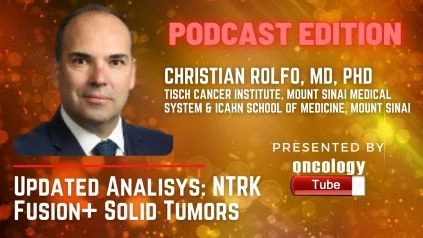Christian Rolfo, MD, Ph.D., MBA, Dr.hc., Professor of Medicine (Hematology and Medical Oncology) and Associate Director for Clinical Research in the Center for Thoracic Oncology at Center for Thoracic Oncology, Tisch Cancer Institute, Mount Sinai Medical System & Icahn School of Medicine, Mount Sinai. In this video, he speaks about an Updated Integrated Analysis of the Efficacy and Safety of Entrectinib in Patients with NTRK Fusion-Positive Solid Tumors.
Â
Â
Outline
Â
Intent:
Â
Entrectinib inhibits tropomyosin receptor kinases (TRKAs)/B/C and ROS1, and has previously elicited profound [57.4 percent] and sustained [median duration of response (DoR) 10.4 months] responses in individuals with NTRK fusion-positive solid tumors in three-phase I/II trials. This paper adds to previous research by including more patients and a longer follow-up period.
Â
Patients and Procedures:
Â
Patients with locally advanced/metastatic NTRK fusion-positive solid tumors and a minimum of 12 months of follow-up were included in the study. By blinded independent central review (BICR), the primary objectives were ORR and DoR; additional goals were progression-free survival (PFS), intracranial effectiveness, and safety. All individuals who had received one entrectinib dose were included in the safety-evaluable populations.
Â
Findings:
Â
The efficacy-evaluable group included 121 adults with 14 tumor types and 30 histologies at the clinical cut-off date (August 31, 2020). The median duration of follow-up was 25.8 months, with 61.2 percent of patients achieving a complete (n = 19) or partial response (n = 55). The median DoR was 20.0 months [95 percent CI, 13.0–38.2] and the median PFS was 13.8 months (95 percent CI, 10.1–19.9). Intracranial ORR was 63.6 percent (95 percent CI, 30.8–89.1) and median intracranial DoR was 22.1 (95 percent CI, 7.4–not estimable) months in 11 patients with BICR-assessed detectable CNS illness. Entrectinib’s safety profile in adults and pediatric patients was consistent with prior data. The majority of treatment-related adverse events (TRAEs) were grade 1/2 and were manageable/reversible with dose adjustments. 8.3 percent of patients experienced TRAE-related discontinuation.
Â
Outcomes:
Â
With further clinical experience, entrectinib has shown to have long-lasting systemic and intracranial responses, addressing the unmet need for a CNS-active treatment in patients with NTRK fusion-positive solid tumors.

